
Fig. 1
Adult immunization schedule 2012, recommended by the Korean Society of Infectious Diseases.
Td, tetanus and diphtheria toxoid; Tdap, tetanus, reduced diphtheria, acellular pertussis; HBsAb, hepatitis B surface antibody; IgG, immunoglobulin G.
a)Hepatitis A (high-risk group): persons with chronic liver disease; persons working at child-care facilities; medical personnel and laboratory workers with potential risk of exposure to hepatitis A virus; food handlers working at restaurants; persons traveling to or working in countries where hepatitis A is endemic; persons who receive blood products frequently; men sex with men; IV drug users; persons who contact with acute hepatitis A patients within 2 wk.
b)Hepatitis B (high-risk group): men sex with men; sexually active persons with more than one partner; human immunodeficiency virus (HIV) patients; IV drug users; household contacts and sexual partners of persons with hepatitis B virus (HBV) carrier; patients with chronic renal failure; patients with chronic liver disease; workers who are frequently exposed to HBV; clients and staff members of institutions for persons with developmental disabilities.
c)Measles-mumps-rubella (vaccination recommended for high-risk group): Although serological test (especially, for measles) can be done for laboratory evidence of immunity, vaccination without serologic test would be cost saving. High-risk group: healthcare personnel (serological test required, 2 doses); persons traveling to developing countries; family member who take care of immunocompromised patient; students who dwell in dormitory.
d)Varicella: vaccination recommended for high-risk group if serological test reveal no evidence of immunity. High-risk group: healthcare worker; family contacts of immunocompromised patients; teachers and child-care employees; students; military personnel; residents of correctional institutions; non-pregnant women with expecting pregnancy; adolescent and adult living in households with children; international travelers.
e)Meningococcal (high-risk group): persons with anatomical or functional asplenia; persons with complement component deficiencies; military personnel; (especially for recruits); laboratory workers exposed to meningococcus; persons who travel or live in an endemic area, particularly if their contact with local populations will be prolonged; college students living in dormitories. 2 dose series is recommended for adults with anatomical or functional asplenia, complement component deficiency, HIV infection; 2 doses should be administered at 0 and 2 mo. Revaccination with meningococcal conjugate vaccine every 5 yr for adults who remain at increased risk for infection.
f)Pneumococcal (high-risk group): chronic lung disease (including asthma); chronic cardiovascular disease; diabetes; chronic liver disease; chronic renal failure; nephrotic syndrome; functional or anatomical asplenia; immunocompromised patients (congenital immunodeficiency, HIV infection; leukemia, lymphoma, Hodgkin's disease, multiple myeloma, other malignancy; solid organ transplantation), (vaccinate with 3 or 4 doses of protein conjugate vaccine for hematopoietic stem cell transplants); prolonged use of high-dose corticosteroids or immunosuppressive agents; cochlear implant. One-time revaccination is recommended for persons aged 65 years or older if they were vaccinated 5 or more years previously and they were less than 65 years of age at the time of primary vaccination. One-time revaccination after 5 years is recommended for patients with chronic renal failure, nephrotic syndrome, functional or anatomical asplenia, immunocompromised conditions, prolonged use of immunosuppressive agents.
Source: adapted from Korean Society of Infectious Diseases. Vaccination for adult. 2nd ed. Seoul: MIP; 2012.



